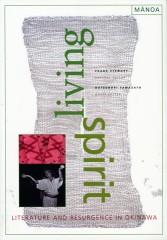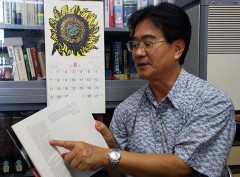Anthology of Okinawan contemporary literature published

Living Spirit: Literature and Resurgence in Okinawa, anthology of Okinawan contemporary literature published by University of Hawaii
August 11, 2011 Ryukyu Shimpo
University of Hawaii has published Living Spirit: Literature and Resurgence in Okinawa, an anthology of Okinawan contemporary literature, with the concept of it being unique literature, existing beyond the bounds of Japanese literature.
In cooperation with University of the Ryukyus, University of Hawaii presents a range of works of Okinawan literature including an Akutagawa Prize winning novel, poetry and Ryuka (Okinawan Lyrical Poetry), and drama.
The university has digitalized these works, publishing them on the Web, which makes them accessible to more than 4000 universities and research institutes all over the world.
The people involved expect that the publication of the anthology will allow Okinawan literature to be read worldwide, saying “Translation of these works into English makes it possible for Okinawan literature to be compared with other literary works in the world, letting the world know that Okinawan literature has universally appealing themes.”

At University of the Ryukyus in Nishihara Town, Katsunori Yamazato said, “Okinawan literature has aspects to it that go beyond Japanese literature.”
The anthology was co-edited by Frank Stewart, professor of University of Hawaii and Katsunori Yamazato, professor of University of the Ryukyus, who proposed the publication.
Twenty-four researchers from within Japan and the United States undertook the English translation of the works.
The anthology includes six novels including Mabuigumi by Shun Medoruma, The Paper Plane at the Empire State Building by Eikichi Nagado and Round-trip over the Ocean by Tami Sakiyama.
Among these works, Eiki Matayoshi’s The Wild Boar That George Gunned Down, which depicts an African American member of the military suffering from psychological problems before going to fight in the Vietnam War, stands out with regard to the theme of how the people of Okinawa view the United States, which treats Okinawa as a colony, and so has a significant impact on its readers.
In the category of contemporary poetry, the anthology includes works by Baku Yamanoguchi, Shinichi Kawamitsu and Mikio Yonaha, Tokuzo Makiminato and Ben Takara.
The anthology includes the dramatic version of Tatsuhiro Oshiro’s The Cocktail Party, the first Okinawan novel to be awarded the Akutagawa Prize. This work will be released in theaters in Hawaii in October.
Higa’s photographs capturing the festive rites of Okinawa and the Amami Islands feature in between each of these works.
The anthology includes The Omoro Soshi (a compilation of ancient poems and songs from Okinawa and the Amami Islands), Shushin Kaneiri (Possessed by Love, Thwarted by the Bell), a Kumi Odori by Tamagusuku Chokun and classic folk songs. It introduces overseas readers to the culture of Okinawa, which has been inherited from Ryukyu Dynasty.
Horrific memories of the Battle of Okinawa and the experience of being ruled by the U.S. military administration have had a significant influence on postwar Okinawa, and its unique history and cultural background have been constant and important themes in Okinawan literature.
Yamazato said, “The cultural heritage of Okinawa, which can be traced back to Omoro (Okinawan classic folk songs), sits outside the bounds of Japanese literature. Okinawan literature has grown significantly in the context of the oppression and the complicated political climate since the war. It is not simply one of the regional literatures of Japan, and has aspects to it that go beyond Japanese literature.”
(English Translation by T&CT, Mark Ealey)
Previous Article:“The World Youth Uchinanchu Network” launched for the Festival, calls for young people to participate through Facebook
Next Article:Low indictment rate for crimes involving U.S. military personnel in Okinawa
[Similar Articles]
- Release of “Omoro Soshi, Part 1”, First Volume of the Compendium of Ryukyu Literature
- Event introducing Okinawan literature held at US Library of Congress
- Medoruma’s In the Woods of Memory to be first Okinawan novel published as stand-alone English book
- Kurara Chibana publishes her first anthology
- The 5th Worldwide Uchinanchu Fesitival
Ukwanshin Kabudan from Hawaii sings “to help maintain the spirit of Uchina”
 Webcam(Kokusai Street)
Webcam(Kokusai Street)


